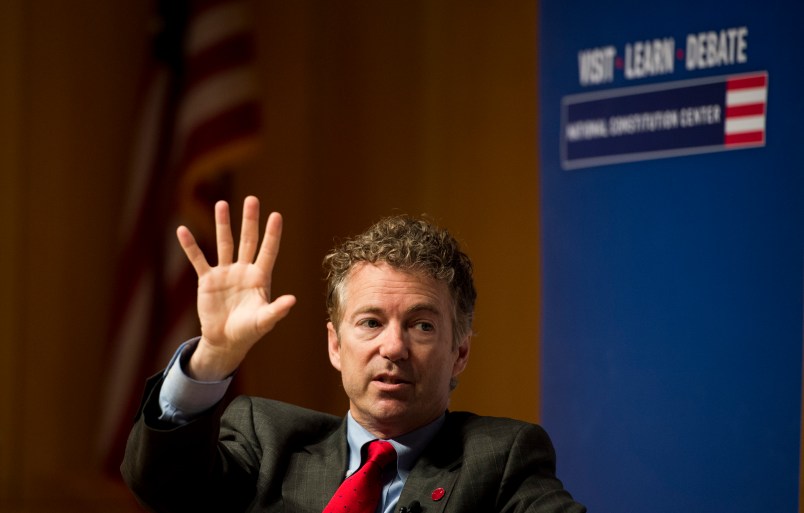This is an intentionally provocative headline. But I think it’s merited.
Republicans in the past always had a big edge when it came to small donor fundraising because they had a very robust direct mail infrastructure and because the demography of the GOP fit nicely with that kind of fundraising. That began to change dramatically a bit over a decade ago when new organizing and the cash channel of the internet got Democrats into the game with a vengeance – first most visibly with the 2004 Dean campaign and then at an entirely new level with President Obama. They were the most visible. But it was happening in smaller races around the country over the course of the decade. But we’re now seeing, at least on the GOP side, how the Supreme Court’s changes in campaign finance laws are rapidly diminishing the role of small donors.
This isn’t because they can’t donate. But Supreme Court’s Billionaire Rule, embodying in the Citizens United decision, just makes them much less important.
Rand Paul used his latest run at the Patriot Act as a major fundraising event. This isn’t to take anything away from Paul on this issue. Whatever else you make of Rand Paul, this isn’t mercenary. It’s entirely in line with the views he’s espoused since he arrived in the Senate over four years ago. But it’s a big issue for his supporters and he’s taken full advantage of that fact to raise cash for his presidential campaign.
The problem is his key rivals just don’t need to. Why? Because Cruz, Santorum and Rubio each have at least one key billionaire in their corner who can keep the money flowing. Jeb Bush meanwhile doesn’t have one billionaire. He’s got lots. Or rather he’s got the organized Republican business community behind him.
Rand Paul has been desperately looking for his own billionaire supporter. But as Politico noted last week he hasn’t been able to find one. And time seems to be running out for him to do so.
The best he’s been able to do is get some assurances from folks like Sheldon Adelson that he had no plans on specifically going after Paul.
The reasons cited range from not terribly surprising (an anti-establishment candidate isn’t a big appeal for conservative billionaires) to downright comical (he’s showed up at cattle call events wearing jeans and dressing too casual). On one level this might be cast as an argument for the continuing centrality of small donor networks. If Paul didn’t have access to this small donor base, partly inherited from his father, his campaign would be effectively over. But I don’t think that’s the best way to look at it.
As it is, Paul will have to rev his fundraising machine nonstop just to stay in the game – and probably stay in the game at a distinct money disadvantage. But Cruz and Rubio don’t really need to worry about this or even focus that much time on fundraising. They definitely need to keep raising money. Don’t get me wrong. But it simply does not need to be the kind of live-or-die focus that it needs to be for Paul. And they won’t need to rev the machine at 5 or 6 thousand RPMs more or less constantly like Paul does. It even allows guys like Rick Santorum to run again almost on a lark.
If someone covers your first class plane ticket and hotel bills, why not go to Europe for a few weeks?
The magic of small donor fundraising was (and to an extent still is) that it allowed candidates who could harvest money from small donors to compete with candidates who relied on the max-out set to fund their campaigns. An extra addition was that small donor fundraising could, to an extent, be automated. It didn’t require the same amount of candidate calls and in person appearances. But the Supreme Court’s Billionaire Rule, at least on the GOP side, just makes a lot of that moot.






